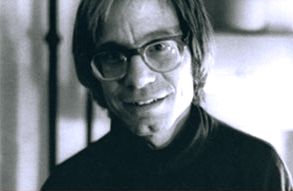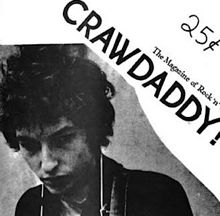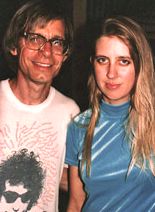 Once upon a time, rock journalism meant something.
Once upon a time, rock journalism meant something.
Rolling Stone featured real musicians on its covers. Rock stars like John Lennon and Grace Slick had the freedom to speak at length to like-minded fans — without the filtering of publicity mills and without the need for musicians to double as salesmen.
Music lovers eagerly awaited the verdicts of their favorite album reviewers. Hell, they even called them “critics,” like they worked for Downbeat or something.
Before that, the only U.S. music publications for adults were the trades, Billboard and Cashbox. Getting the skinny on the latest Brit bands meant skimming 16, Tiger Beat and the other pop fanzines aimed at pimply girls. Every now and then, Time or Life would devote a page to some shaggy pop act.
 The tide turned 47 years ago with a dinky publication called Crawdaddy! It was first published in 1966 by rock fan and Swarthmore freshman Paul Williams. Crawdaddy! was, along with what was once Rolling Stone, the most influential rock magazine ever published.
The tide turned 47 years ago with a dinky publication called Crawdaddy! It was first published in 1966 by rock fan and Swarthmore freshman Paul Williams. Crawdaddy! was, along with what was once Rolling Stone, the most influential rock magazine ever published.
The sad news just came that Williams has died at age 64 — along with the even sadder update that the music writer spent his final years suffering from Alzheimer’s disease and related dementia.
Williams was first in a long line of writers who accepted rock music as an art form. In fact, there barely was a rock music at the time — it was still rock ‘n’ roll to most of the world.
“My vision was of a magazine where young people could share with each other the powerful, life-changing experiences we were having listening to new music in the mid-1960s,” Williams wrote many years later.
Williams was still a teen when he and a pal put together the first issue of Crawdaddy. They huddled around a mimeograph machine cranking it out in a Brooklyn basement. Williams wrote it all.
Williams was a fan of Billboard and Cashbox, as were all the guys who worked in record stores, and he had the good business sense to send copies to radio stations and the music industry execs listed in Billboard’s annual directory.
The total budget was $40, which included “peanut butter sandwiches, and the one album I bought and reviewed, Simon and Garfunkel’s ‘Sounds of Silence,'” Williams recalled.
 Good choice. Paul Simon called Williams in his dorm room, saying it was the first intelligent writing about their debut album. (Dylan also put in a call to the dorm, apparently.) Simon also corrected the young writer’s fact error that Art Garfunkel played guitar for the duo. Simon invited Williams to meet them at a New York show, and so began the rock writer’s extraordinary access to the now-legendary music makers of the era.
Good choice. Paul Simon called Williams in his dorm room, saying it was the first intelligent writing about their debut album. (Dylan also put in a call to the dorm, apparently.) Simon also corrected the young writer’s fact error that Art Garfunkel played guitar for the duo. Simon invited Williams to meet them at a New York show, and so began the rock writer’s extraordinary access to the now-legendary music makers of the era.
Williams soon had good company at the magazine. Jon Landau, Sandy Pearlman, Lenny Kaye and Peter Knobler all wrote for Crawdaddy!
“Crawdaddy! was a crusade,” Williams recalled. “When I started it people said, how could you possibly write about rock ‘n’ roll? You know, there’s nothing to write about — ridiculous!”
Williams and company championed the Doors, the Blues Project, the Paul Butterfield Blues Band, the Grateful Dead, Bob Dylan, Pink Floyd, Frank Zappa, Sly and the Family Stone … all of them.
Williams became close to Dylan, the Dead and John Lennon. He can be heard chanting on the John & Yoko “Give Peace a Chance” recording, and as the guy locking and loading a rifle on the Doors’ “Unknown Soldier.”
“Perhaps than any of the other early rock writers, Paul lived inside the new world the music heralded,” his official biography says.
“There weren’t very many rock journalists, so it was easier to get access for the few people who were,” Williams recalled. “I saw the Doors, the Buffalo Springfield, and Jefferson Airplane and so forth before they were nationally known. So, yeah, you always had access to bands at that level.”
Williams’ early writings reflected his age and enthusiasms. The grammar was shaky, and by today’s standards the writing was awkwardly conversational. But Williams understood the importance of what he was listening to, long before anyone working for mainstream media.
Peter Buck of R.E.M. said of Williams: “His writing was very conversational and fan-oriented, in the sense that he was a fan. … He brought things out of the music in a way that you didn’t get from ‘The Ed Sullivan Show.'”
Lenny Kaye, a longtime rock writer before he created “Nuggets” and played guitar for Patti Smith, hailed Williams: “Finding issue No. 7 at a ‘head shop’ on St. Mark’s Place in the winter of 1966 was a life-changing experience, showing me a new way to understand the music I loved, and how I might repay the favor through my own words.”
In 1968, Williams left the publication — sick of running a business on a shoestring — and went on to write several dozen books about music and science fiction. The first was “Outlaw Blues: A Book of Rock Music,” a collection of his writings from the magazine.
Crawdaddy! went establishment in the mid-1970s — writing about the Fonz and Olivia Newton John — and deservedly went under. It then was revived by Williams in 1993 and lasted for 10 years. The Crawdaddy! archives are now owned by Wolfgang’s Vault.
Williams had this retrospective take on the role of a critic:
It is difficult to be a critic; people expect you to explain things. That’s all right if you don’t know what’s going on — you can make up almost any clever-sounding explanation, and people will believe you. But if you do understand a poem, or a song, then chances are you also understand that you’re destroying it if you try to translate it into one or two prose sentences in order to tell the guy next door “what it means.”
 Williams was a friend and fan of the science-fiction giant Philip K. Dick and served for several years as his literary executor. His Rolling Stone article on Dick is credited with bringing the sci-fi master’s work to mainstream attention.
Williams was a friend and fan of the science-fiction giant Philip K. Dick and served for several years as his literary executor. His Rolling Stone article on Dick is credited with bringing the sci-fi master’s work to mainstream attention.
Williams’ dementia was a result of a bicycling accident. His wife, the singer Cindy Lee Berryhill (left with Williams), and son sought to raise funds for his care via a Paul S. Williams web site.
He died at home in Encinitas, Calif. He was born in Boston in 1948.
Donations to help cover the family’s expenses during Williams’ long illness are encouraged.
A newsstand carried something called Crawdaddy! I grabbed the latest two issues. Back home, I subscribed, and amazingly, the issues came right on schedule.
The next year, I wrangled press credentials to a rock festival (writing for some hippie rag) and my Paul Williams imitation appeared in print. I’d found a way to participate in the new music other than bad bass playing.
A long-winded way of saying that this web site never would have existed without Paul Williams and Crawdaddy! He influenced so many, changed so many lives, but that’s my Crawdaddy! story.
— Glenn Abel
Nice article! Didn’t know that about Unknown Soldier.
Race: Think Paul was a rock Zelig of sorts. He was at the John-Yoko bed-in. Thanks for checking in.